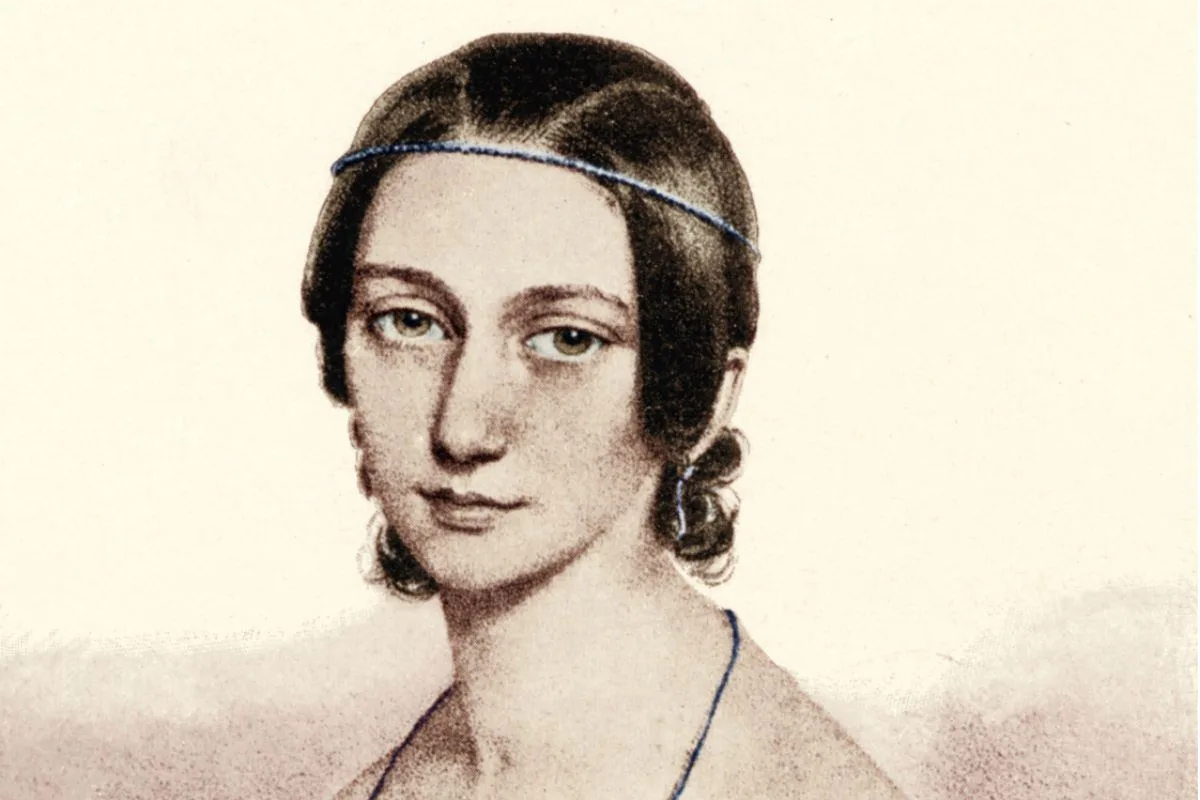Pushing the six-year-old Wolfgang Amadeus Mozart and his sister Maria Anna round the concert halls of Europe, Leopold Mozart was the archetype of what we would now call the Pushy Parent – the Tiger Father, if you will, of classical music. As musical prodigies go, Mozart was up there with the best of them - and his father, say what you will about him, knew what he had on his hands.
But if treating one’s offspring as a musical entrée to high society and a quick buck did not necessarily start with Leopold, his efforts undoubtedly contributed to the trend.
The trouble with pushy parents, of course, is that not all of them push in the same direction. George Frideric Handel’s father directed him strongly towards a career in law, banning the young Handel from playing the violin. Conversely, his more musically inclined mother reacted by secretly installing a clavichord in the attic.
'Go wallow in the filth of Paris!'
Some families delighted in their child’s musical obsessions. Take, for example, the family of Samuel Coleridge-Taylor, whose relations clubbed together to put him through the Royal College of Music. At the other extreme, few parents went as far in their disgust as Berlioz’s devoutly Catholic mother, Marie-Antoinette.
‘Go wallow in the filth of Paris, sully your name and kill me and your father with sorrow and shame!’ Mama Berlioz cried, after her renegade son announced that, having qualified in medicine, he would really rather go off and compose instead.

And so, in honour of Leopold Mozart, we take a look at ten composers whose parents ranged from those who had their foot too hard on the pedal to those who didn’t even know where the pedal was. Pushy didn’t always means productive, however – sometimes it paid simply to let talents and passions develop in their own, unique way…
How to parent musical prodigies: ten ways to get it right (or wrong)
Let's take a look at how some of our great composers found their talents helped, or hindered, by their parents. Were any even able to (whisper it) enjoy a normal childhood while making waves in the classical music world? Read on...
1. Wolfgang Amadeus Mozart
Biographers have largely not been kind to Leopold, but in his time he was recognised as a passionate and innovative teacher. A jobbing court musician and composer, he sacrificed his own career to promote the incredible musical talents of his children, Maria Anna (Nannerl) and Wolfgang, although the former was forced to retire when she reached marriageable age.

Leopold tirelessly promoted his son, setting up introductions at many European courts. Denounced by some as controlling, it was inevitable, at any rate, that the wilful Mozart would eventually cut loose.
Parental verdict
His methods may have been controversial, but Leopold got results.
2. Ludwig van Beethoven
Beethoven’s treatment at the hands of his alcoholic and pushy musician father was nothing short of abuse. Johann Beethoven – a tenor at the court of the Archbishop of Cologne at Bonn – recognised his son’s talents early on. Aware of Leopold Mozart’s success, Johann allegedly kept Beethoven up all night practising, pulling him out of bed to perform and beating him if he did not play to his alcohol-fuelled standards.

Greedy, too, he deliberately cast confusion over Beethoven’s birth date to make his prodigy son appear younger than he really was. Ludwig, aged 17, eventually obtained a court order to procure half his father’s salary to look after his long-suffering family.
Parental verdict
Alcohol, abuse: it’s hard to find much good in Beethoven’s upbringing.
3. Fanny Mendelssohn
Sister of Felix Mendelssohn and one of the most dazzling musical prodigies in her own right, Fanny Mendelssohn was taught to play the piano by her mother, Lea, who had herself been trained by a student of Bach, and supported, at first, by her father Abraham.

Fanny excelled at both the piano and composition, and yet societal constraints fell hard on her, as they had on Nannerl Mozart. ‘Music will perhaps become his (Felix’s) profession, whereas for you it can and must be only an ornament,’ said her father, devastatingly, of her prospects, shortly before she attained that ominous marriageable age. Luckily, her new husband did not take the same view.
Parental verdict
Mixed messages from the Mendelssohns for their talented daughter.
We named Fanny Mendelssohn one of the best female composers of all time
4. Johann Strauss II
Strauss’s famous dad, Johann I, might have been the feted father of the Viennese Waltz - but he was determined not to foster any musicians. Strict and domineering, Strauss Sr mapped out the future careers of all seven of his legitimate children, with Johann marked down as a banker.
Strauss Jnr had other ideas, secretly taking violin lessons with the leader of his father’s orchestra, but was apparently whipped to ‘beat the music out of him’. Luckily for Strauss, his philandering father subsequently had seven more children with his long-term mistress. The heat now off, Strauss pursued his musical leanings, aided – very keenly – by his jilted mother, Anna.
Parental verdict
No stopping that Strauss family waltz gene, despite Father’s best efforts.
5. Clara Schumann
Clara Wieck’s outstanding talent led her driven father, Friedrich, to make her an example of his intensive teaching method, with daily theory, harmony and counterpoint, plus two hours' practice.

His requirement to learn pieces from memory made Clara a sensation. If there wasn’t much love shown, he at least exempted her from onerous domestic chores to allow her to concentrate on composition - something which her future husband, Robert Schumann, did not.
Parental verdict
A rock-solid training for Clara - but a cosy childhood was but a dream.
More musical prodigies
6. César Franck
César Franck was the classic example of a wunderkind suffering from the exertions of an over-ambitious father. Bank clerk Nicholas-Joseph Franck doggedly flogged his young son around the salon circuit as a pianist-composer, but pushed him onto the Paris public too soon.

Reception was muted, even scornful, his father’s blatant commercial instinct alienating critics. Franck eventually rebelled and married the girl who was the dedicatee of a song that his overbearing father had torn up on account of the fact that her parents were ‘mere’ theatre actors.
Parental verdict
The public spotted a gimmick when Franck senior tried to cash in.
7. Camille Saint-Saëns
Acclaimed by one critic as ‘the most remarkable child prodigy in history’, Camille Saint-Saëns grew up under the formidable tutelage of his mother Clémence and his great aunt, Charlotte Masson.
Yet, unusually, Clémence held him back from the limelight, realising that Paris faced prodigy overload. When he finally debuted at the Salle Pleyel, aged ten, he offered an encore of any Beethoven sonata requested – from memory.

Clémence continued to critique his compositions rigorously, even opening his post for him every day of his adult life. Beleaguered Tiger Mothers of the world, note: he adored her. Not all musical prodigies, it seems, must sacrifice love and warmth for ambition and success.
Parental verdict
A tough life, but it was happy families all along in this musical household.
8. Samuel Barber
Samuel Barber was obsessed with music, a fact that his parents looked upon with benign dismay, even though his mother, Margaret McLeod, was a pianist.
Hoping to produce the archetypal all-American youth, Samuel was raised on athletics and football. Barber, aged 9, confided in his mother his ‘worrying secret’. ‘Now don’t cry when you read it because it is neither yours nor my fault... I was not meant to be an athlet [sic]. I was meant to be a composer, and will be I’m sure....’ Needless to say, football was kicked into touch.
Parental verdict
Despite attempts to make him a jock, Barber stuck firmly to music.
9. Scott Joplin
Florence encouraged her son Scott Joplin by letting him play the piano in the houses in which she worked as a cleaner. This interest in music brought both mother and son into conflict with Joplin’s father Giles, a former slave who, although a part-time musician himself, wanted his son to learn a more practical trade.

When Giles left them, Florence worked hard to support her son and managed to engage local professor Julius Weiss, who taught Joplin for free. She acquired a second-hand piano so that Joplin could practise at home. And so one of the 20th century's great musical prodigies was able to flower.
Parental verdict
Tough beginnings that didn’t stop a remarkable talent shining through.
We named Scott Joplin one of the most influential black composers of all time
10. Michael Tippett
Ensconced in the family home in rural Suffolk, the young Michael Tippett had no real means of hearing live or recorded music. His parents – a successful businessman and a card-carrying suffragette – felt that music was ‘frivolous’, leaving him to his own musical devices.
The epiphany came, far from home, at a concert near his boarding school in Lincolnshire. His father was eventually persuaded to fund his studies at the Royal College of Music, on the notion that he might just make a living as a concert pianist.
Parental verdict
A slow start in music, but Michael's parents were won round in the end.
We named Tippett one of the best English composers of all time
Main image: Leopold Mozart with his children Wolfgang and Nannerl at the piano, the portrait of their deceased mother on the wall. Oil on Canvas by Johann Nepomuk Della Croce, around 1780. © Getty Images
